- Home
- Learn
- Healthcare
- 5 best healthcare CRM in the United States
HEALTHCARE
5 best healthcare CRM in the United States
Contents
If you are looking into healthcare CRM software, you are probably trying to fix something operational. Maybe patient inquiries are coming in from too many places. Maybe intake and follow-ups take more manual effort than they should. Or maybe your team does not have a clear view of patient communication outside the clinical record.
Many healthcare practices already use solid systems for medical records and billing. What often remains less organized is everything around patient communication and coordination. That includes first contact, intake steps, appointment follow-ups, and ongoing patient outreach.
There are tools built specifically to bring structure to this side of healthcare operations. These tools are commonly grouped under the term healthcare CRM.
In this guide, we compare the leading healthcare CRM platforms in the United States and help you understand which ones are worth considering, depending on your practice size and workflow needs.
A healthcare CRM is a software that helps you manage your healthcare workflows and patient relationships more easily.
For example, when a patient fills out an inquiry form, calls your front desk, books an appointment, submits intake details, asks a follow-up question, or needs a reminder — all these actions create information your team has to handle correctly and on time. A healthcare CRM is built to organize this non-clinical work, so nothing slips through.
It gives your staff one place to see what has already happened and what needs to happen next with each patient.
Instead of checking emails, spreadsheets, call logs, and notes separately, the CRM pulls these interactions into a single record. That way, anyone on the team can quickly understand the patient’s journey so far and continue the process without confusion.
In practical terms, healthcare teams use a CRM to:
Unlike general business CRMs, healthcare CRMs are designed to support healthcare workflows and privacy requirements, including regulatory safeguards such as HIPAA compliance.
A healthcare CRM brings patient data into one secure, organized system. Instead of staff searching through multiple tools or paper records, they can quickly find contact details, appointment history, and past communications in one place. This reduces errors, saves time, and helps teams respond to patients with better context.
Healthcare CRMs make it easier to stay in touch with patients through automated reminders, follow up messages, and health alerts sent by email or text. Clear and timely communication helps patients remember appointments and stay on track with care plans.
Many repetitive tasks such as scheduling reminders, intake follow ups, and outreach campaigns can be automated inside a CRM. This reduces manual workload and lets staff spend more time supporting patients instead of handling routine paperwork.
When departments share the same CRM, everyone sees the same notes and updates. This shared visibility improves teamwork and reduces miscommunication during referrals, transfers, and follow-ups.
Most healthcare CRMs include dashboards and reports that show trends in patient engagement, service usage, and outreach results. These insights help organizations adjust strategies and improve service delivery.
Healthcare CRMs are designed with strict security controls like access permissions and audit logs. This helps organizations safeguard sensitive patient information and stay aligned with privacy regulations.
| CRM | Popular For | Average rating | Pricing |
| LeadSquared Healthcare CRM | Patient intake tools, EHR integration, Omnichannel communication, automated workflows, mobile-friendly access | 4.3 / 5 | Pro – $60 per user/month Super – $100 per user/month |
| Salesforce Health Cloud | Deep integration and customization capabilities, secure messaging, automated reminders, reporting & analytics | 4.0 / 5 | Health Cloud Enterprise – $350 per user/month Health Cloud Unlimited – $525 per user/month Health Cloud Agentforce 1 – $750 per user/month |
| Keap (formerly Infusionsoft) | Email and SMS automation workflows, HIPAA-enabled intake forms, contact segmentation, scheduling & payments | 4.1 / 5 | Starts around $299 per month for up to 1,500 contacts and 2 users Additional users: $29–$39 per month each Larger contact lists: $329–$399+ per month |
| Creatio Healthcare CRM | 360 degree patient interaction history, visual workflow automation, case & task management, low-code integrations | 4.6 / 5 | Growth – $25 per user/month Enterprise – $55 per user/month Unlimited – $85 per user/month |
| eClinicalWorks (eCW) | Unified clinical and scheduling tools, AI-assisted charting, patient portal & mobile access, multi-specialty support | 3.3 / 5 | Core EHR – $449 per provider/month EHR + Practice Management – $599 per provider/month Optional add-ons (AI tools, kiosks, RCM) – priced by quote |
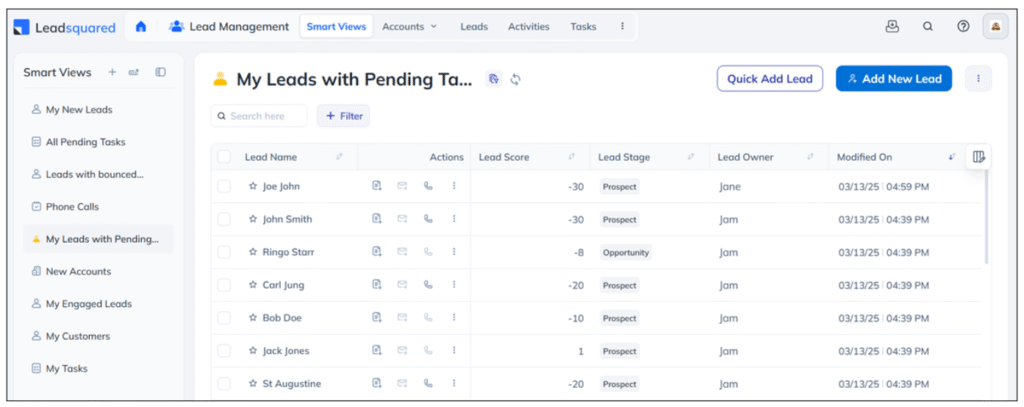
LeadSquared is a CRM purpose-built for healthcare that also doubles as a patient intake and engagement platform. It offers tools to automate intake, schedule appointments, manage referrals, and more. LeadSquared is used across clinics and hospital networks of all sizes that need a system to handle their everyday operations.
A user reported on Capterra that the system is highly customizable, allowing them to tailor everything from reports to button placements and user permissions to fit their needs.
One user pointed out that the platform’s back-end is quite complex, which meant they had to rely heavily on their account representative for fixes or new implementations.
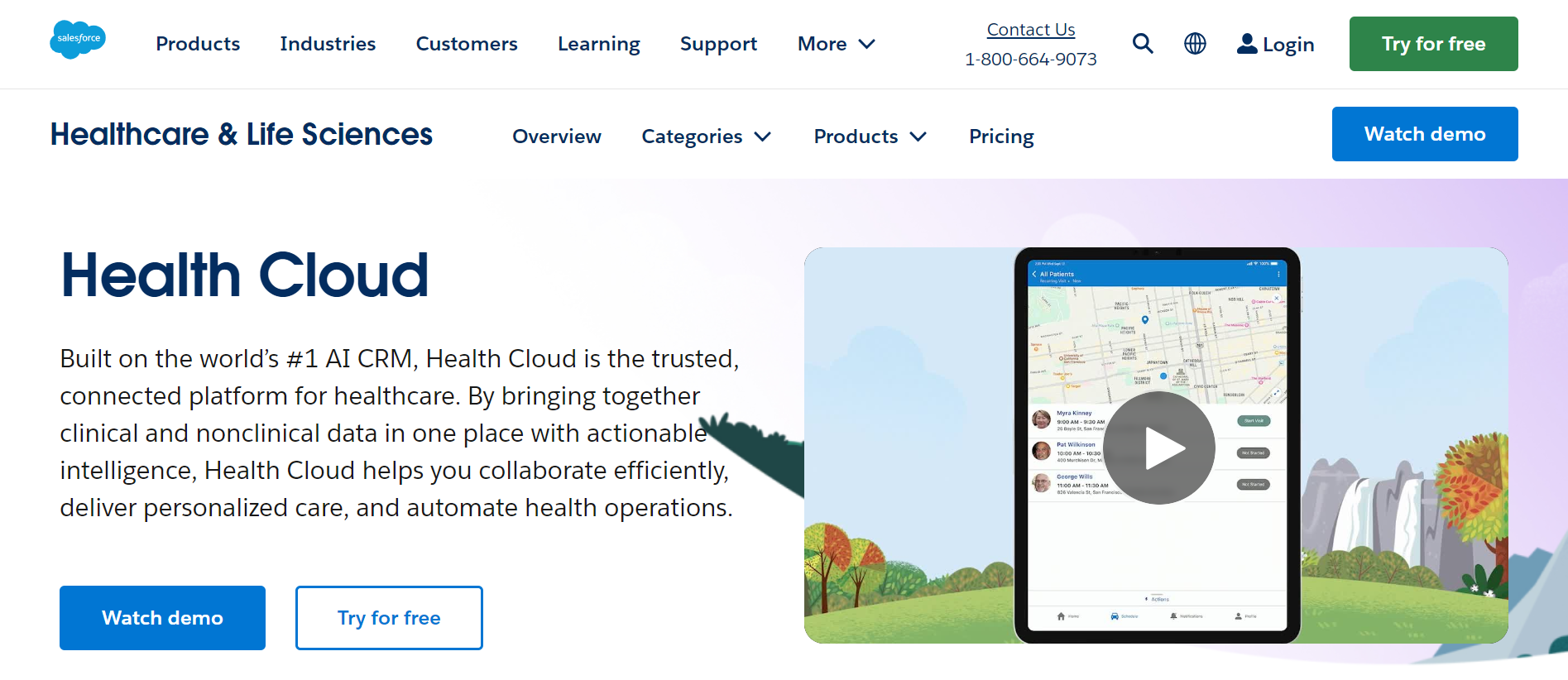
Salesforce Health Cloud takes the best of Salesforce’s popular CRM system and refocuses it around healthcare. It helps healthcare practices manage patient relationships and improve communication between teams. It’s built to support HIPAA compliance and complex workflows.
A user shared on G2 that Salesforce Health Cloud makes it easy to monitor care plan progress, check claim statuses, and communicate directly with agents. They also appreciated the intelligent system that recommends resources and programs to support healthier habits and lower costs.
According to one reviewer, the platform provides more capabilities than their team currently uses, which can make it feel cluttered at times. They added that performance is generally stable, though large data loads can be slowed by encryption-related delays.
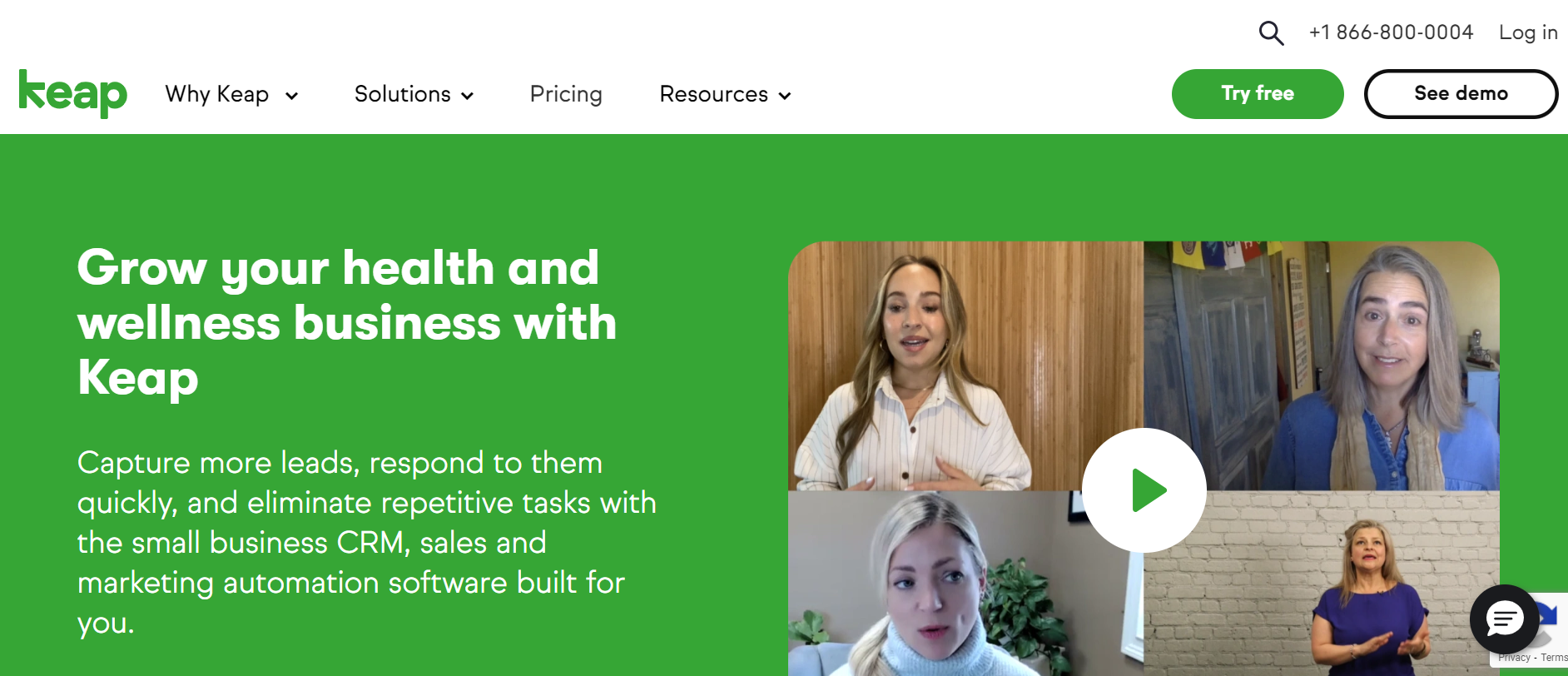
Keap is a flexible CRM platform that can be set up for healthcare use. It helps practices manage lead capture, patient intake, messaging, appointment reminders, and payments. It includes optional HIPAA settings and a BAA, making it suitable for clinics and small health services that need automation.
One customer highlighted on G2 Keap’s superior automation features and responsive support, calling it their favorite among all CRMs they’ve tried.
Documentation quality was a major concern for one user, who found themselves relying on old APIs due to a lack of up-to-date guidance.
Keap’s pricing is based on the number of users and the size of the contact list, and there is no free plan beyond the trial period. Most small teams pay a monthly amount that scales with their contacts:
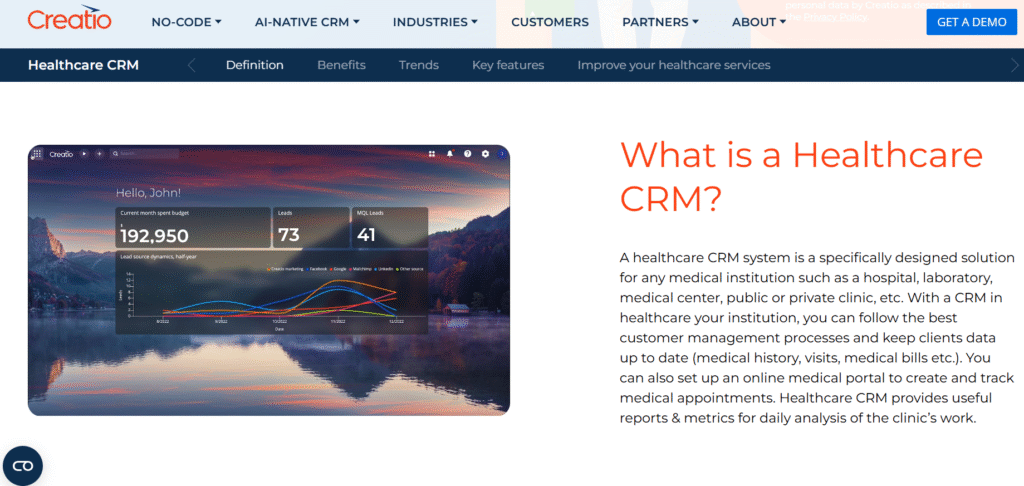
Creatio is a healthcare-friendly CRM built on a low-code platform. It gives clinics and hospitals tools to handle their appointments, documents, patient communication history and more. It also lets them automate healthcare workflows like intake, follow-ups, and claims tracking.
A reviewer highlighted on G2 how Creatio’s low-code platform simplifies workflow automation and noted the ease of integrating with other systems via APIs.
A reviewer mentioned that Creatio has a steep learning curve for those without coding experience.
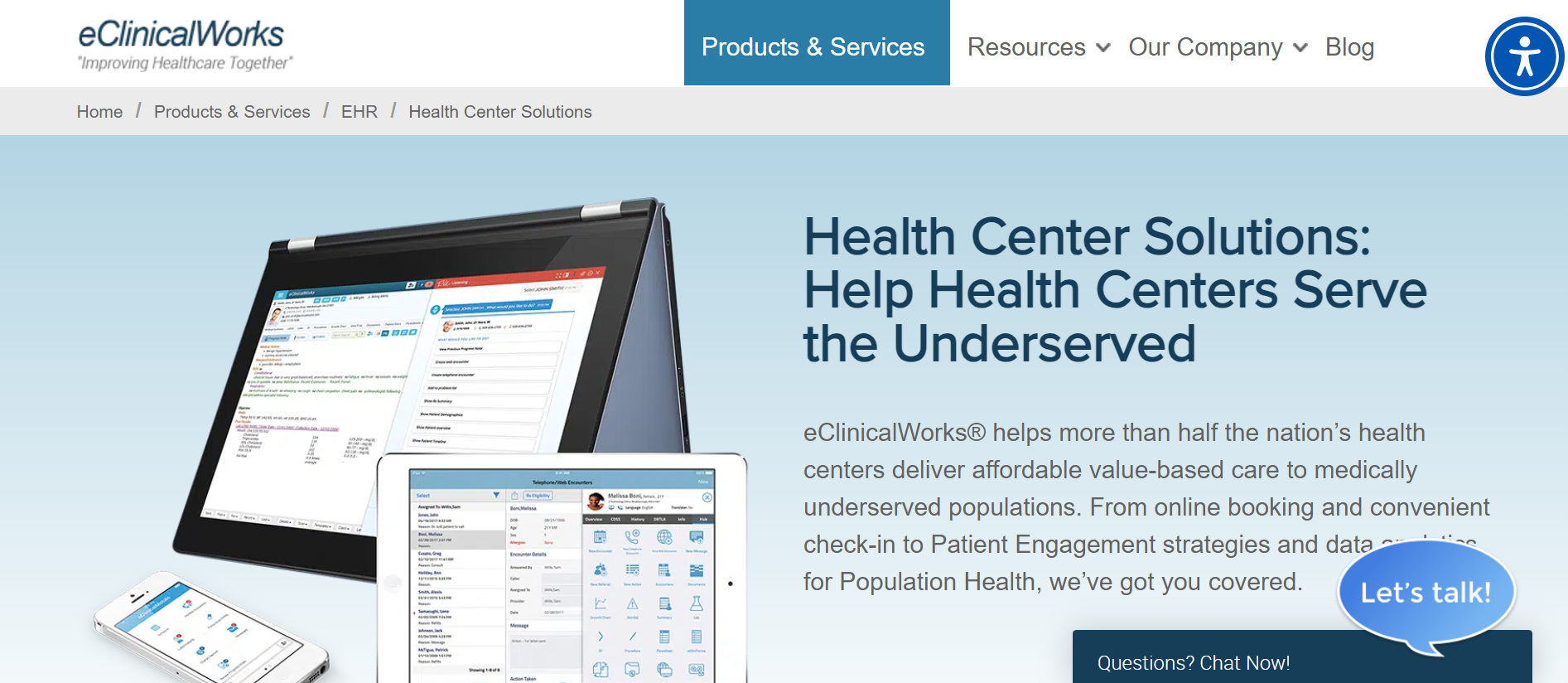
eClinicalWorks, often called eCW, is best known as an electronic health record system, but it also includes Patient Relationship Management features that work much like a healthcare CRM. It combines clinical records with scheduling, patient communication, billing, telehealth, and analytics in one cloud-based platform. Because these tools are built into the same system, practices can manage both medical and patient engagement workflows without switching software.
One user highlighted on G2 eClinicalWorks’ wide-ranging features like e-prescribing, scheduling, billing, and its customizable templates for faster documentation.
The same user noted challenges with pricing, navigation, and support, adding that data migration and setup can be time-consuming.
There’s no perfect healthcare CRM. As we saw, every tool has its strengths and weaknesses.
Some are packed with features but can feel bloated. Others are simple but leave you wanting for more. At the end of the day, it comes down to what fits your needs.
LeadSquared’s healthcare CRM is one option that tends to land in the middle ground. It’s built for practices that want to speed up their healthcare workflows through automation. It covers all the essentials like patient intake, referral management, messaging without feeling like you need a week of training to get started.
If it sounds close to what you’re looking for, a short demo might help you see how it fits.
Healthcare CRMs do not replace your clinical records system. Instead, they connect with it, so patient contact information, appointment details, and communication history can flow back and forth. This connection reduces data entry errors, keeps information up to date across systems, and makes it easier for staff to work from one unified view of a patient without jumping between separate platforms
The cost varies widely based on the system you choose, the number of users, and the integrations you need. Cloud‑based options often charge per user per month, while enterprise systems can include additional modules or usage fees. You should also factor in setup, training, and integration costs when evaluating total investment.
When picking a CRM, start with security. Make sure it’s HIPAA-compliant and protects patient data with strong features like encryption, user access controls, and activity logs. The best CRMs handle compliance in the background, so you can focus on care—not paperwork.
Look for a CRM that improves patient communication too. Tools like appointment reminders, secure messaging, and self-service portals help you stay connected with patients and save staff time.
Also, check that the CRM works well with your current systems, like your EHR and scheduling tools. A smooth integration means less manual work and fewer errors.
Finally, make sure the CRM fits your needs, is easy to use, fits your budget, and can grow with your practice.
Yes. Most healthcare CRM systems include reporting dashboards that show trends such as engagement levels, follow‑up completion, appointment volumes, and communication effectiveness. These insights help leadership make data‑driven decisions to improve operations and care delivery.
Many healthcare CRM systems include tools to run automated patient outreach. This can mean sending targeted emails or text messages for appointment reminders, seasonal health alerts, wellness education, or re‑engagement campaigns for patients who haven’t been seen recently.
FHIR and HL7 are standards used in healthcare to help different software systems share information in a consistent and secure way.
At its core, HL7 (Health Level Seven) is a set of rules and guidelines for exchanging healthcare information between computer systems. It has been used for many years to let systems like hospital records, lab software, and clinical tools talk to each other in a common format instead of relying on manual data transfers.
FHIR (Fast Healthcare Interoperability Resources) is the newest standard developed by the same organization (HL7) and is designed to make data exchange easier, faster, and more flexible. FHIR breaks patient and clinical data into small building blocks called “resources” (such as patient details, allergies, medications, and appointments). Software applications can then request or send this information using modern web-based methods called APIs (application programming interfaces).
In the context of healthcare CRM systems, FHIR and HL7 help the CRM connect with other systems like EHRs, scheduling tools, or patient portals. By using these standards, the CRM can pull in or send data — for example, appointment details or updated patient contact information — in a way that is consistent and understood across systems.
Q